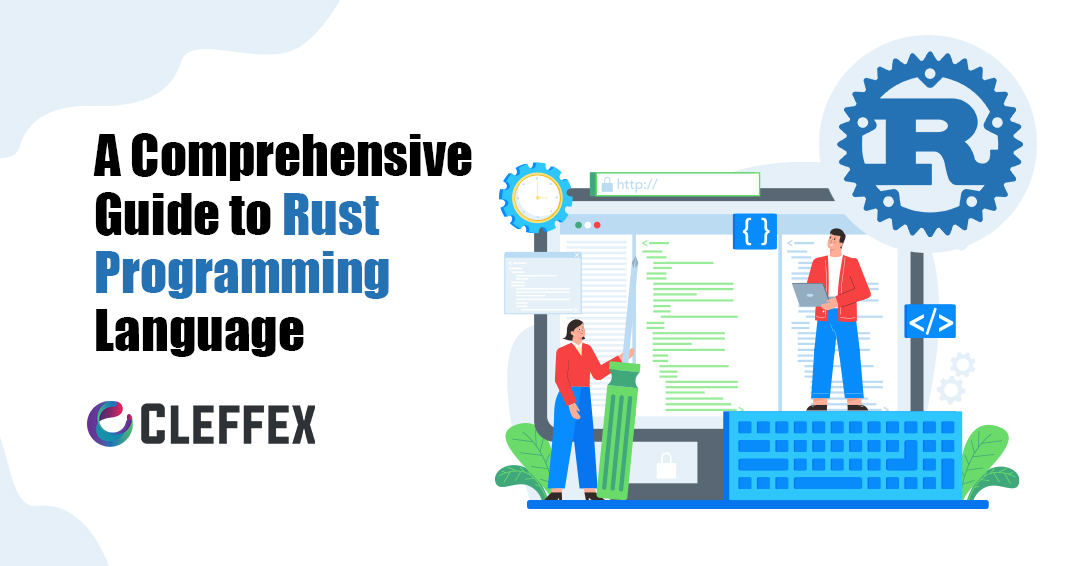Rust programming language was in development since 2006 by Graydon Hoare and was supported by Mozilla Firefox since 2009. Although it was released to the public in 2015, it has been continuously evolving since 2010. The developer community quickly recognized the potential and advantages of Rust over more popular programming languages such as C and C++, resulting in its widespread adoption.
Industry leaders such as Amazon, Google, Huawei, Microsoft, and Mozilla established the Rust Foundation in 2021 to provide support for the Rust programming language and its community. The foundation aims to reinforce Rust’s position as a dependable and highly beneficial programming language in the tech industry for many years to come.
This blog delves into the reasons why Rust has gained immense popularity among developers and earned the trust of the tech community within a short period. It also explores the scenarios where Rust web development can be the most advantageous and outlines its use cases.
Increasing Popularity of Rust Programming Language
Rust has consistently been one of the most desired and admired programming languages for several years. There is a significant increase in the number of software developers who have shown interest in Rust development.
The adoption of Rust by prominent tech companies is inspiring:
- Mozilla, where the inventor of Rust, Graydon Hoare, worked, was the first company to invest in and support the language. Firefox’s CSS engine, Stylo, replaced about 160,000 lines of C++ code with only 85,000 lines of Rust code.
- Dropbox has written core file storage components in Rust, and Rust is used to develop features of its file-syncing engine.
- Cloudflare uses Rust because it offers WebAssembly support and created Pingora, an in-house HTTP proxy that serves over one trillion requests a day.
- Discord switched from Go to Rust to avoid latency spikes with their Read States service.
Why Developers Choose Rust Programming Language?
In a recent survey of 9,354 Rust developers, the main reasons for using Rust were identified as follows:
- The language’s ability to create bug-free and accurate software (96%)
- The high performance of the language (92%)
- The language’s strong security properties (89%)
The Rust programming language is supported by these three key features that contribute to its effectiveness.
Many well-known and sizable corporations are benefitting a lot from utilizing and choosing Rust programming language. Let’s explore these benefits in the following section.
Benefits of Rust Programming Language
Software that is free of errors and functions properly
Rust programming language offers the assurance of correct and error-free software. If the code successfully compiles, it is guaranteed to be correct and function as intended. Unlike other programming languages that may have undefined behavior, which can lead to bugs that are difficult and costly to fix during production, Rust applications are predictable and less likely to fail during production.
Memory safety
Rust programming language ensures memory safety in software development by enforcing an ownership model and implementing the Resource Acquisition Is Initialization (RAII) concept. This eliminates memory leaks and negates the need for manual memory management. Additionally, unlike other languages such as Java and C#, Rust does not require a garbage collector to free unused memory, which can significantly impact the runtime performance.
The importance of Rust’s memory safety in application development can be exemplified by the common issue of memory leaks in C++ applications. In C++, the manual freeing of memory is often not considered in advance, leading to a continuous growth in memory use over time. As the system continues to exist, it will consume more and more memory until it is entirely exhausted. At this point, the system becomes stuck and requires a reboot, causing inconvenience to both the business and its users.
Top-level Performance
Rust programming language delivers high performance by eliminating the negative impact of virtual machines and garbage collectors used in other programming languages. Garbage collection can halt the application’s progress until it completes its job, leading to slower performance. Rust’s ownership model and RAII concept ensures uninterrupted and high-performance application development.
Security
Rust programming language provides secure software development through its memory safety and correctness features. Rust’s safe development approach helps prevent a range of memory-safety vulnerabilities that can compromise software security, leading to data corruption, crashes, and malicious attacks. Rust’s borrow checker helps mitigate common vulnerabilities, including use-after-free, dangling pointers, out-of-bounds read and write, and buffer overflow, improving software security overall. However, it’s essential to implement general security measures during development and not rely solely on Rust’s built-in security features.
Sustainability and energy efficiency
Rust is considered one of the most energy-efficient programming languages, alongside C. Its memory safety and security benefits make it more sustainable and energy-efficient than C. Rust’s efficiency is further enhanced by being a fast-compiled language without a garbage collector or virtual machine. This is why many prominent companies, such as AWS, are actively implementing Rust for next-generation sustainable software development. While Rust development may require more initial effort and investment, the resulting software product is energy-efficient, cost-efficient, and secure, and it won’t require frequent and costly updates in the future.
Detailed Documentation & Supportive Community
The Rust programming language has a supportive and fast-growing community, with well-organized and detailed documentation available. The Rust community provides strong support and feedback, enabling developers to exchange ideas and experiences and drive the adoption of the language globally.
The following section will examine Rust’s use cases in the business world, providing a closer look at what has made it one of the most popular programming languages and its position in the modern technology ecosystem.
What Exactly is Rust Used for and why do you need it?
Rust is a versatile programming language that has functional programming capabilities and can be used to create efficient, scalable, maintainable, and productive software components. Rust can be utilized for building high-performance distributed systems, embedded systems, IoT solutions, and various web services.
An example of Rust’s prominence in the industry is its use in the Linux Kernel, which is predominantly coded in C. Rust support was added to the Linux kernel modules by the Linux community. When Mozilla Firefox adopted Rust, it became one of the fastest browsers worldwide.
Rust Use Cases
Systems Programming: Embedded & Distributed Systems
Rust programming language is well-suited for systems programming and developing embedded systems. Rust frameworks allow the development of bare-metal and real-time operating system (RTOS) embedded systems. Rust is useful for developing firmware for bare-metal systems, where it can run directly on the microcontroller hardware without an abstraction layer of the operating system and drivers. For RTOS embedded systems, a real-time operating system is required, particularly for applications that require a fast response time.
An embedded operating system, Tock, written in Rust is a good example of Rust’s use in embedded systems. Tock is appropriate for IoT platforms and sensor networks, enabling several applications to run simultaneously on a microcontroller-based computer. Theseus OS is another embedded operating system built in Rust, which is useful for high-end embedded systems and edge data centers. Rust is also suitable for applications that require processing significant amounts of data in large distributed networks, such as those found in IoT and medical device manufacturing. Therefore, adopting Rust can be highly advantageous for such industries.
IoT Connectivity & Edge Computing
Rust is an ideal language for enhancing the performance of IoT technologies. In 2019, 42 Technology developed single-chip IoT devices using Rust and found that writing firmware in Rust was faster than in C. Rust has vast potential for ensuring fast IoT connectivity in embedded systems, making it highly versatile for cloud, edge, and IoT devices. For instance, Rust is useful for writing firmware to process sensor data efficiently in IoT devices. Additionally, it can help maximize network performance for edge gateways and data centers. Rust has high productivity, making it an advantageous programming language in the cloud environment as well.
High-performance Development Toolsets
Rust is frequently used to build development toolkits and libraries that can simplify and accelerate software development. The language is particularly well-suited to creating libraries that can handle high loads, like those used for image or data processing. By using Rust-based libraries, developers can create applications that are both scalable and fast. Rust is also useful for creating debugging and testing tools, which can help developers quickly identify and fix software vulnerabilities.
Low-latency web services
Rust is being used by several major companies to develop the backend logic for their web services. Some companies use Rust to provide video conferencing services that are high-quality and high-performance. Rust is suitable for any kind of client-server architecture, making it an ideal choice for building web services. It ensures low latency and high performance for web applications and platforms. However, software performance also depends on the programming language and the software architecture.
Just using Rust for the backend logic of a software system may not improve its performance. It’s important to first check if the software architecture can handle high loads. Rust can work well with other programming languages and can be used to build efficient web services that allow for easy communication between applications written in different languages.
All the use cases of Rust mentioned above illustrate that it’s a great choice for developing business software systems, as it optimizes hardware utilization and unifies hardware and software components to create a cohesive and productive system.
Present Status of Rust Software Development Services
Rust is a new programming language with a unique approach that can be challenging to learn, even for experienced developers in other languages like C++. For beginners, it can also be tough, but not having prior knowledge can also be an advantage. Though Rust has a steep learning curve, it can be mastered, and its advantages make it an attractive option for developers.
One challenge of using Rust programming language is its limited availability of libraries, open-source tools, and services compared to more established programming languages. This means that developers may need to create more services from scratch, which can lead to longer development times. However, as Rust continues to gain supporters, its ecosystem and expertise are also growing, which means that more tools for Rust will likely become available in the future. Despite these challenges, Rust has gained popularity and is now among the top 10 highest-paying programming languages globally, with Rust developers earning an average of $87,047 per year, according to Stackoverflow’s 2022 Developer Survey. This recognition adds to Rust’s reputation as a promising programming language that is gaining recognition in the development industry.
While developers may be enthusiastic about Rust, many businesses are not as keen on the language. However, we believe that Rust has a lot of untapped potential that will be revealed in the future. Compared to other programming languages like C and C++, Rust is capable of much more.
If you are interested in Rust and want to find true experts in this field, here are a few tips on how to hire Rust developers!
1. Opt for software companies with Rust proficiency rather than individual freelancers.
2. Ensure that the skills and experience of the Rust developer you choose align with the specific needs of your project.
3. Approach your search for a vendor with the mindset of a collaborator rather than just a buyer.
Final Thoughts
Businesses can play an important role in promoting Rust as a promising programming language by actively using it in their projects. By choosing Rust, businesses can gain a competitive advantage in their industry as this language has huge potential for future growth. Although the adoption rate of Rust is still slow, many companies are investing in its development, indicating its promising future. By choosing Rust, businesses can not only benefit from high-performance and memory-safe software but also become part of a growing community that is shaping the technology industry.
Choosing Rust development comes with its own set of difficulties and obstacles. These challenges may not only arise during the initial stages of software development but also during the actual development process. However, with the right software vendor and a willingness to commit to the project, you can have a unique solution that doesn’t require constant investment in maintenance and support. Rust programming language requires a larger-scale way of thinking, and the question is whether you are prepared to take on this challenge.
If you are looking for a skilled software development company, with excellent application development services and custom website development services to partner with, reach out to Cleffex! We are excited and ready to provide innovative solutions that are customized to fit your specific needs and preferences!









